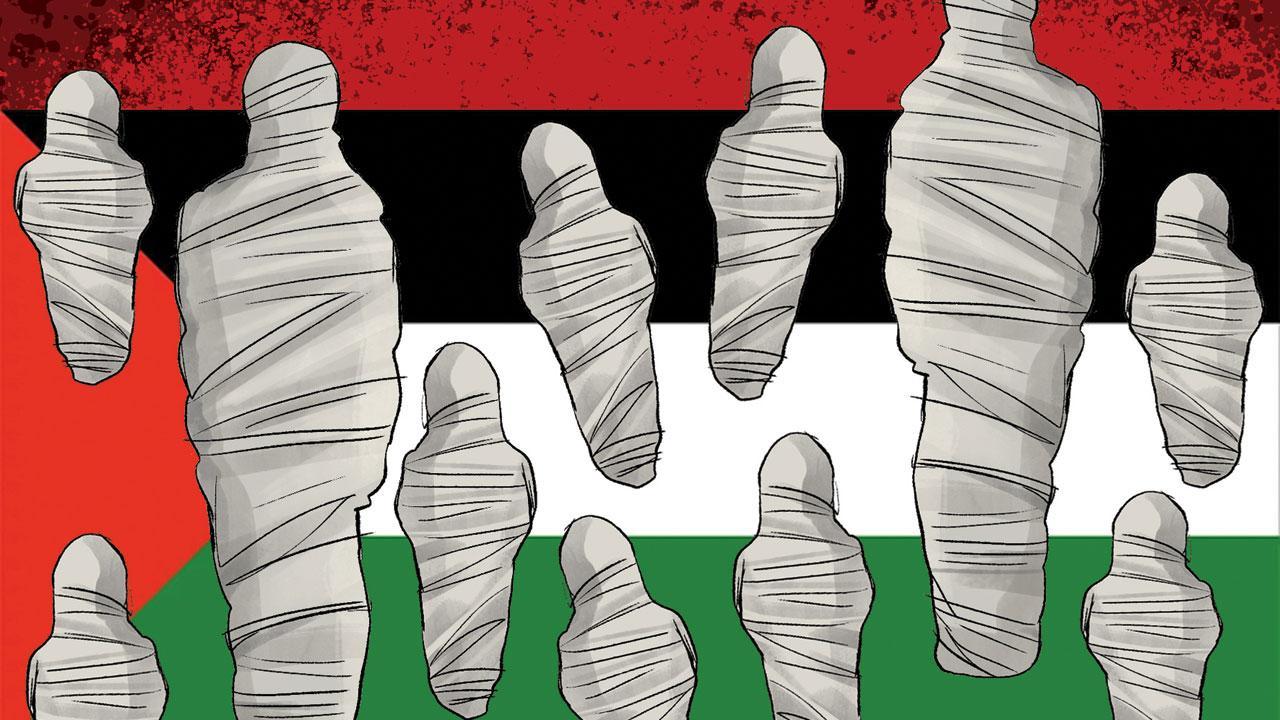The act of naming is an epic stand in the face of name-calling. Zionists have called Palestinians animals, rabid dogs, people of darkness—a dehumanising name calling that is a call for extermination.

Illustration/Uday Mohite
![]() US President Joe Biden claims doubt about the number of Palestinians reported killed even as Israeli bombing intensifies to barbaric proportions. The Palestinian Health Ministry responded by releasing names, ages, gender and ID numbers of 6,747 people who had been killed—including 2,665 children.
US President Joe Biden claims doubt about the number of Palestinians reported killed even as Israeli bombing intensifies to barbaric proportions. The Palestinian Health Ministry responded by releasing names, ages, gender and ID numbers of 6,747 people who had been killed—including 2,665 children.
ADVERTISEMENT
The act of naming is an epic stand in the face of name-calling. Zionists have called Palestinians animals, rabid dogs, people of darkness—a dehumanising name calling that is a call for extermination.
The act of naming is a painful assertion of dignity and humanity in the face of inhumanity and callousness. We have known some as names on social media, showing us the reality of Palestinian lives and deaths. We have woken up to hear artists we followed—Heba Zagout, Heba Kamal Abu Nada—have died. We have learned the name of the Al-Jazeera journalist who received the news of his family’s death in a bombing, just after a live broadcast—Wael Al Dahdouh—and we have wept with his colleague who then reported this fact on television. Because we have known the names of some, we have witnessed the anguish of those whose names we do not know—the doctors who discovered their kin among the dead brought into their hospital, the children who have lost entire families—not as the pornography of violence, but with the unbearable pain of witnessing a human tragedy and the anger of witnessing political injustice. We have seen the names on those accounts fall silent one by one, then all at once as Israel cut off the internet preceding even more horrific attacks.
This act of naming is deeply political. Unlike the “human interest story” where a person is divorced from context and their story told as a “universal” human experience, this naming insists that we recognise the context these people have lived and died in: their identity as people and their identity as a people. That we acknowledge political and emotional truths as one. It demands that we remember our humanity and with it the capacity to acknowledge the humanity of others, as a human act and a political act. It resists, and demands a reversal of the gaze that determines truths which enable violence. It demands that we name that gaze for what it is: racism, power, prejudice.
Also read: Orthodox bowler, unorthodox man
It demands we name the gaze which made Meta add terrorist to all user bios on Instagram. “A glitch in the algorithm” they called it, like others have called genocide the right to self-defence. A Freudian glitch then—but whose? Eve Cohen, an Israeli make-up influencer posted a video blackening her teeth and powdering her face, mocking Palestinians affected by bombing as fakes. No technical glitch has been visited on such posts. But, the account Eye on Palestine was taken down and by the way at this moment cannot be seen from Canada. A Freudian coincidence of the free world perhaps.
As one journalist emphasised, who are the countries that cast doubt on the figure of the Palestinian dead? The US, UK and Israel-countries that want to downplay numbers to pretend they are not party to a genocide in order to retain moral and political centrality. The naming of the dead in this war names the injustices at the heart of the world order, and asserts the need for a global liberation from this continuous colonisation.
Paromita Vohra is an award-winning Mumbai-based filmmaker, writer and curator working with fiction and non-fiction. Reach her at [email protected]
 Subscribe today by clicking the link and stay updated with the latest news!" Click here!
Subscribe today by clicking the link and stay updated with the latest news!" Click here!







